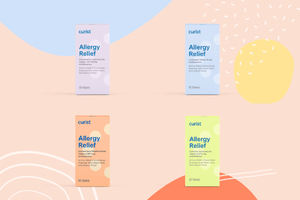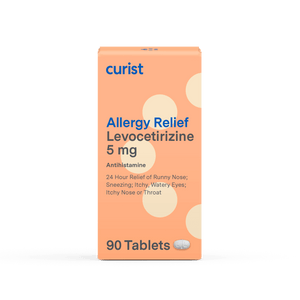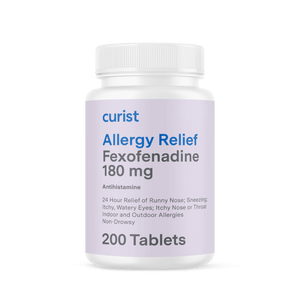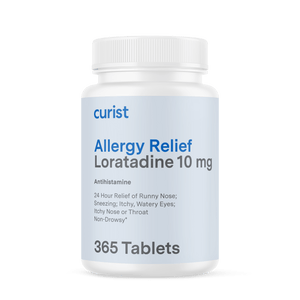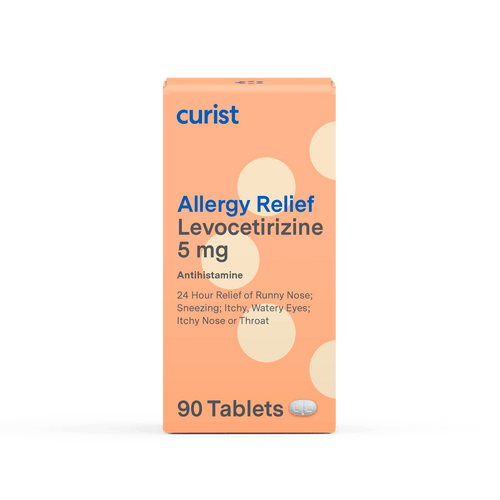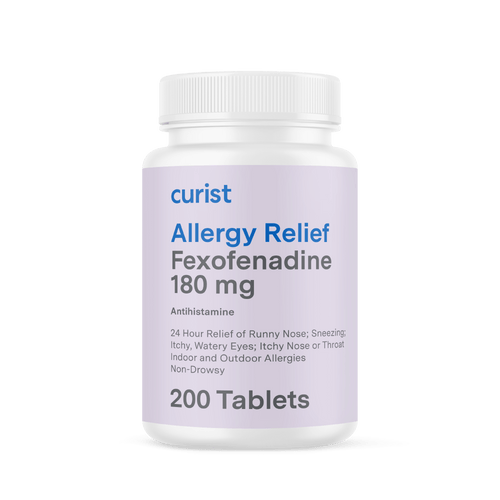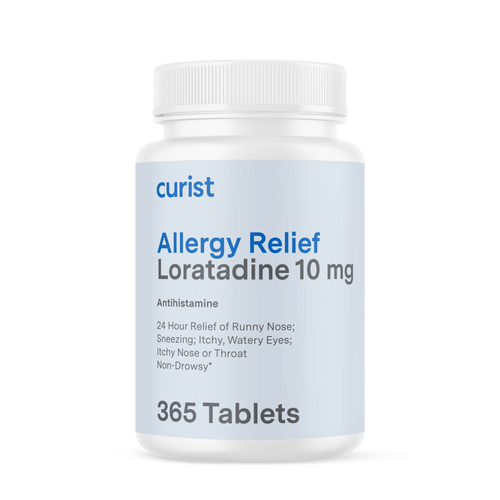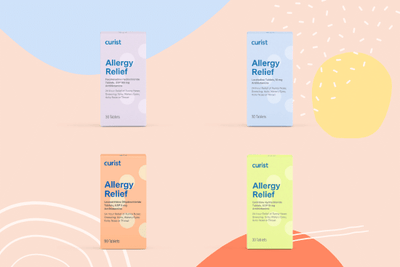Curist delivers over-the-counter medicines to your door at a fraction of the price of traditional brands. We hope everyone stays safe and healthy during this time.
Did you know that roughly 70% of American households include a furry friend? Have you been considering fostering baby kittens, but don’t want to live with allergy symptoms day to day? We all love our furry friends, but sometimes we need help with our cat allergy symptoms. Read more about what you can do if you think you are allergic to cats, but can’t keep your paws off them.
How Do I Know If I Am Allergic to Cats?
When we talk about our most common four-legged friends, it is important to note that you are two times more likely to be allergic to cats than dogs. While both types of pets can trigger allergy symptoms with their skin, fur, saliva, or urine such as itchy eyes, watery eyes, runny nose, or sneezing, cats can spread their saliva further when they groom themselves. Grooming makes their skin flakes or dander “sticky” which means it can be much harder to clean cat dander from household surfaces. The proteins in cat saliva and skin are often the culprits for cat allergies such as skin rash, hives, and/or coughing as well.
Cat dander particles are allergens that are small enough to float around in the air and bother your lungs, sinuses, eyes, and nose for long periods of time. Additionally, if you have an outdoor cat, cats can bring in other allergens like pollen, ragweed, or mold, into your home as well. If left untreated, mild symptoms may get worse over time causing chronic sinus headaches, asthma, or infections.
However, even though cat allergies do exist, there are more ways to go about it than parting ways with your lovable cat.
Can I Suddenly Become Allergic to Cats?
You may suspect that you are allergic to cats if you notice allergy symptoms, such as itchy eyes, watery eyes, or sneezing, when you visit your friends with adorable cats. But how is this possible if you used to be perfectly fine around cats as a child? The answer is that it is entirely possible that you could develop a cat allergy suddenly later in life. You may experience a runny nose or nasal congestion after being in the house with the cats for a few minutes or hours, or notice an itchy rash or hives when the cat licks you.
Can I Live with a Cat if I Have Allergies?
Depending on the severity of your cat allergies and personal preference, you can continue living with a cat even if you have cat allergies. Interestingly, if you have seasonal allergies, you are more likely to be allergic to cats than dogs. However, it may help to follow some of these tips to reduce your symptoms:
- Avoid touching the cat. If you have cat allergies, the best practice is to avoid touching the cat in the first place; however, that is not always possible. Therefore, avoid touching your face and wash your hands immediately after petting or touching a cat.
- Keep the cat out of your bedroom. This will reduce the amount of cat dander in your sleeping area and help you rest with less allergy symptoms.
- When dusting or cleaning your home, use a face mask to prevent breathing in cat allergens.
- Change your air conditioning (AC) filters often and adjust the humidity level to ~40%. In those conditions, it is harder for cat dander to travel through the air.
- If possible, remove any carpets and clutter from the home as it is easier to clean cat dander from wooden or tile flooring. Also, cleaning your walls, curtains, upholstery, and bed linens can often reduce allergens.
- To help clear the air of pet dander as much as possible, you have several options: You could install a high-efficiency particulate absorbing (HEPA) filter for your entire house or apartment, use a HEPA filter vacuum or Roomba each week, purchase an air purifier for specific rooms with high paw traffic, or cover your air vents with a filtering material like cheesecloth to prevent cat hair from entering the vents. All of these will reduce the level of cat allergens in your home.
- If your cat is okay with it, you could consider brushing and bathing your cat weekly to see if it reduces symptoms. Consider using low-dust litter and cleaning their litter box several times a week if you can.
Usually cat allergies are not dangerous, but in rare cases it can lead to a serious allergic reaction called anaphylaxis. Within minutes of exposure, if you experience face or throat swelling, rapid heart rate, shortness of breath, wheezing, blue skin, weakness or dizziness, you should seek medical attention right away.
How Can I Get Rid of Cat Allergies? Do Cat Allergies Go Away?
The first step to addressing your cat allergy symptoms is to identify and avoid known allergens. If you are unsure, you can ask your doctor or allergist to help you find the exact source of your allergy. If you live with your cat, keep it outside if at all possible or limit your direct exposure to the cat. If your cat has always been an indoor cat, try to use slip covers for any couch cushions, buy a HEPA air filter, vacuum the floors more frequently, and most importantly, wash your hands after contact with your furry friend. Even with thorough cleaning, it could take months or years before your home is clear of cat dander.
In some cases, people who are exposed to an allergen like cat dander over time will notice fewer and fewer allergy symptoms; however, this is not always the case. If you need additional relief, there are allergy shots available for those over the age of 5 years old, which take place over the course of a couple of years that can help lessen symptoms. Additionally, you can treat allergies to cats similarly to pollen or seasonal allergies with oral decongestants or oral antihistamines like Curist Allergy Relief (levocetirizine), a nasal spray like Curist Allergy Nasal Spray (fluticasone propionate 50 mcg), eye drops, and inhalers if necessary. Since everyone responds differently to different medications, here are some more options you may explore over-the-counter to treat cat allergies.
What are the Best Antihistamines for Cat Allergies?
Some of the best antihistamines for cat allergies include Curist Allergy Relief (levocetirizine), fexofenadine (brand Allegra), and cetirizine (brand Zyrtec). These oral antihistamines are effective at reducing cat allergy symptoms such as sneezing,and itching. If you are curious about the similarities and differences between these allergy relief medications, check out our comparison article on Allegra vs Claritin vs Xyzal vs Zyrtec to see which option best suits you!
If you have a lot of nasal congestion with your cat allergies, you can consider using an over-the-counter nasal spray such as Curist Allergy Nasal Spray (fluticasone propionate). If you have high blood pressure, you should avoid this medication.
If over-the-counter antihistamines and nasal sprays are not enough to treat your cat allergies, consider taking allergy shots administered by an allergist to treat cat allergies. Allergy shots for cat allergies can take 6 months or more to train your immune system to not respond to cat allergies, but are a very effective treatment for cat allergies.

